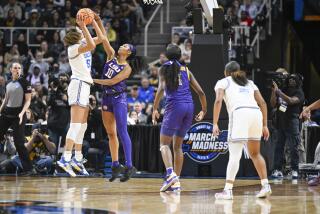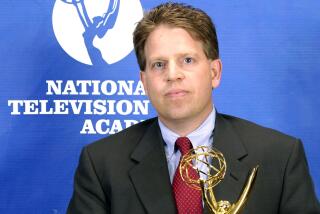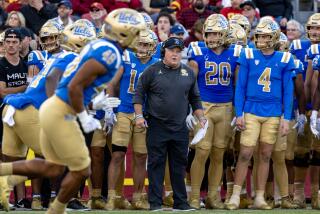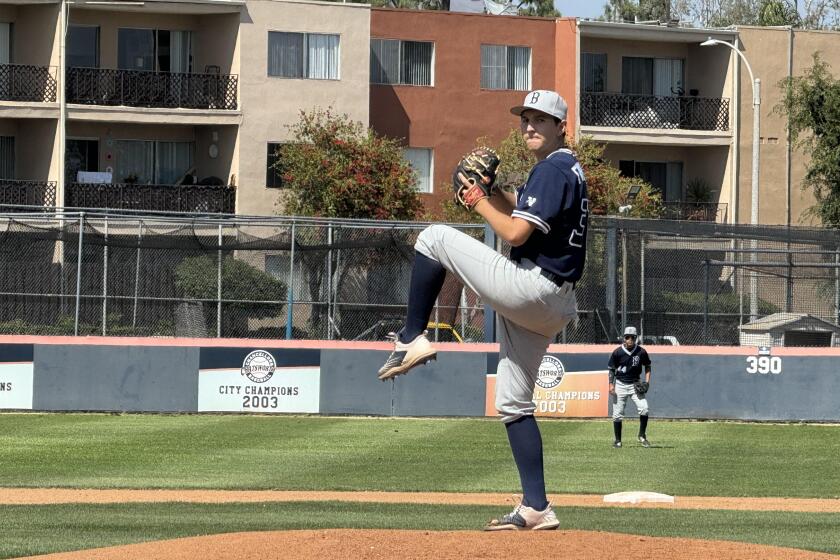ESPN’s Doug Gottlieb brings a rare quality to sports-talk radio: context
You don’t often go to sports-talk radio for moments of exemplary journalism. Actually, you never go there.
But there it was last week, during a typical morning drive on a typical Los Angeles freeway, with ESPN’s Doug Gottlieb typically holding court.
For those of you who quickly move the dial at the sound of sports talk, at the incessant gushing, cackling and sucking up, or the all-too-obvious promotional slop on behalf of teams whose games are on that station, you may have missed Gottlieb, or lumped him with many of the rest.
He is different, in a good way, which probably explains his network gig.
“You don’t have to like what I say, nor how I say it,” he said. “I just try to be real, and let people know I’m fallible, like anybody else.”
The topic that day was Penn State, specifically the pressure that Mike McQueary was under and the closed college sports world where he existed at State College, Pa. Gottlieb theorized that McQueary had slightly different thought processes than somebody off the street, upon witnessing his coach, friend and mentor, Jerry Sandusky, in the shower with a young boy.
He went on to paint a picture of what it is like in the inner circle of a major college athletic program, any major college athletic program.
“I was trying to show what Sandusky was like in State College,” Gottlieb said when asked to elaborate in an interview later. “If they had a Mt. Rushmore there, he’d be in it. He had to be a god-like figure.”
His message during his broadcast was not that McQueary should be forgiven for his actions, or lack of them. Nor that any of the Penn State story should be viewed as any less disgusting or horrifying because an athletic department is a closed club and any breach in the secret handshake is unthinkable. Gottlieb was merely trying to give his listeners context, which is also a journalistic element.
The question, of course, was how would Gottlieb know?
He not only answered that, but in such a surprising way that his entire verbal essay on the Penn State case took on new credibility.
Gottlieb told his audience how he had been through a glossed-over situation himself as a college athlete. His case was nowhere near as important, nor with anywhere near the national implications of Penn State’s. But it was his, he was guilty, and his listeners deserved this additional perspective.
He told it quickly. It wasn’t the first time he has done this on the air, but it was the most detailed, and it sounded painful in the listening. He admitted it had been, even though he knew, going in, that the subject matter would necessitate this.
“It’s always painful,” he said. “It’s over. It’s gone. It is a marriage and three children ago. But it happened and that truth is never going to go away.”
Gottlieb was a high school All-American in the mid-1990s at Tustin High. As a youngster, he was constantly around major college basketball, while his father, Bob, was the head coach at Jacksonville and at Wisconsin Milwaukee. Doug Gottlieb was highly recruited, chose to go to Notre Dame, and became the starting point guard in his freshman season.
At Notre Dame, Gottlieb stole credit cards from three students, charged about $900 and was caught. Notre Dame called him in, restitution was made and he was told that, instead of being expelled, he would be allowed to leave school and say he was homesick.
“The homesick part was true,” Gottlieb said in the recent interview.
But the rest was the usual semi-truth telling and hiding behind “student privacy” crutches that universities do, similar operational procedures to what Gottlieb was describing in his Penn State essay.
Gottlieb told his listeners how he had agreed, relieved not to be a big headline and a laughingstock. He went home, went to Golden West College the next fall and thought things would end that way. But at Notre Dame, the student newspaper, the Observer, doing some journalism of its own, raised questions about why a starting guard would leave after a successful season. The newspaper cast a cynical eye on the homesick excuse. The three students who had been Gottlieb’s victims read that, came forth and told all.
“It was a front-page story in the L.A. Times,” Gottlieb said. “There was a place at Golden West where athletes gathered for lunch, and I remember walking in there, seeing the paper and all of them, just looking at me.”
He also said that having everything come out was the best thing that happened, that it is easier to live with, and deal with, the total truth. He went on to finish his college career with three seasons as a starting point guard at Oklahoma State, leading his team to the NCAA tournament all three seasons and piling up 947 assists, still 10th all-time in NCAA basketball.
His analysis of the Penn State situation would have passed muster with 95% of the listeners. The other 5% who knew might have wondered how a person who committed a crime, albeit misdemeanors, might speak so freely about others who had allegedly committed crimes.
Part of journalism is full disclosure. If the messenger can’t be trusted, then neither can the message.
“I only had one journalism class in my life,” Gottlieb said. “It was at Golden West.”
Nice work, Golden West.
More to Read
Get our high school sports newsletter
Prep Rally is devoted to the SoCal high school sports experience, bringing you scores, stories and a behind-the-scenes look at what makes prep sports so popular.
You may occasionally receive promotional content from the Los Angeles Times.







